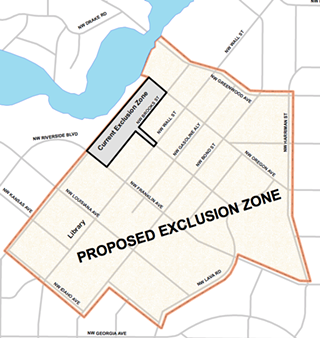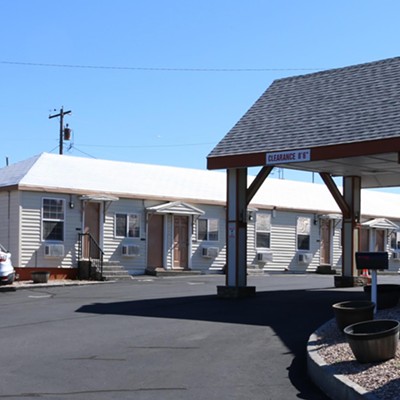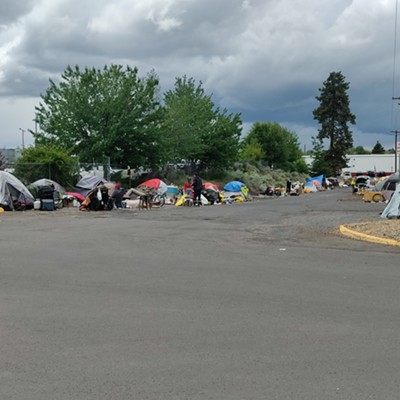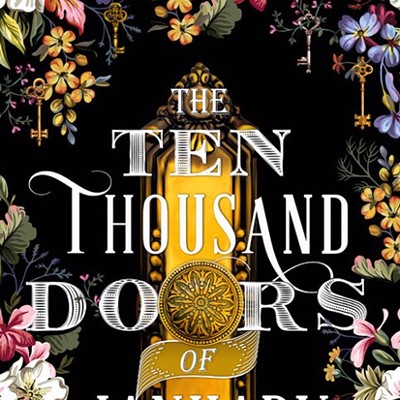As the weather heats up, so too does crime. And this summer, the Bend Police Department is hoping to nip bad behavior in the bud with an expansion of the city's civil exclusion zone. But the move, which would allow police to ban individuals cited or arrested for certain crimes from the downtown area, is not without controversy.
At its May 20 meeting, Bend City Council voted 5-2 in favor of a first reading of an ordinance to expand the zone's footprint. The current exclusion zone, approved in 2010, covers public parks such as Drake Park, the breezeway, and adjacent areas owned by the City. The expanded zone would stretch from Greenwood Avenue to Idaho Avenue and from Broadway Street to Lava Road/Harriman Street.
Since the exclusion zone's inception, Police Chief Jim Porter said 34 people have been excluded. In testimony to City Council, he explained that the majority were banned for drug-related crimes (41 percent), followed by trespassing (23), consuming alcohol in public (15), disorderly conduct (12), vicious dogs (6), and sex crimes (3).
Part of the controversy comes from the basis that the individuals excluded need not be convicted of any crime. And while they have a right to appeal the exclusion, because it is a civil rather than criminal proceeding, they are not entitled to legal representation. Concerns have also been raised about the efficacy of such exclusions and the possibility of simply moving criminal activity to a different part of town.
While Chief Porter and City staff repeatedly emphasized that the exclusion zone is intended to reduce violent crime and chronic offenders, the code includes a long list of eligible criminal citations, ranging from serious person crimes like assault and sexual offenses to more minor missteps including graffiti, littering, and underage smoking. The amendments also add marijuana and dog-related offenses to that list.
"There's a privilege to being part of our society," said Councilor Casey Roats. "If this is the deterrent we need to make downtown nice...I don't see this as being an issue whatsoever."
Councilor Sally Russell noted that the exclusion zone could have some silver lining for those excluded.
"I think this is a really fair tool," Russell said following Chief Porter's testimony. "I remember that a huge percentage of your repeat calls are mental health. We know as a community we are working with that. This is another opportunity. This is a way to pull them into our safety net."
City staff indicated in its report to Council that the expansion would likely reduce the number of incidents police respond to downtown, increase the number of visitors to downtown businesses, and make the area safer. No potential downsides were suggested.
But Councilor Barb Campbell, one of the two who voted against the ordinance, had plenty of concerns. Before sharing her thoughts, she passed out copies of the U.S. Constitution.
"I understand the Constitution fully, and this is not about the Constitution, it's about criminal activity that needs to be curtailed," said Councilor Doug Knight. "I will be supporting this."
But Campbell, who owns the downtown toy store Wabi Sabi, said her concerns about civil rights and unintended consequences outweigh any benefit she might gain as a downtown business owner.
"This thing protects my business and I don't understand how we can do this downtown and not in Northwest Crossing, in the Old Mill," she said. "We treat these individuals like it's a game of Whac-A-Mole," a reference to the carnival game where a player knocks down one "mole" just to have it pop up elsewhere.
She pointed out that similar ordinances had been passed and repealed in Portland and Eugene. In both cases, the American Civil Liberties Union opposed the ordinance.
"The ACLU of Oregon has consistently voiced objection to civil exclusions and we must do so here," ACLU Legislative Director Andrea Meyer wrote in a statement to the Portland City Council in 2010. "To be clear, the ACLU of Oregon does not oppose exclusions when they are issued by the courts."
Meyer continued to explain that exclusions issued by the court as part of a criminal proceeding give the accused the opportunity to be represented by counsel and would not require law enforcement to assume the role of the judiciary by meting out punishment. It's a sentiment Councilor Campbell echoed in her impassioned remarks.
"I just worry about how much of a problem is there, is this really the solution to the problem, are we just pushing this off into the rest of the community?" Campbell continued. "If they're not breaking the law, they're not breaking the law. If they're breaking the law, put them in jail."
But that's easier said than done, according to proponents of the ordinance. In cases where police issue citations and the cited individual does not appear in municipal court, police have little recourse but to send the citation to collections. Chief Porter said the exclusion zone gives police a tool to better manage the behavior of those for whom a citation is little deterrent.
"It's just one more tool to remove criminal behavior downtown," Chief Porter said at the Council meeting. "Whether we're Whac-A-Moling them or not, we want to make this an area that's safe for people."
But Campbell, as well as locals speaking out in the visitors' section, expressed concern about the fact that folks excluded from downtown might simply take their criminal behavior elsewhere, such as the Old Bend neighborhood or other shopping areas.
"If we do this they're going to move to where?" asked Councilor Nathan Boddie, who also voted against the ordinance. "I'm concerned this tool opens up opportunity to sweep some things under the rug that aren't aesthetically pleasing."
Council will vote on a second and final reading of the ordinance at its June 3 meeting.




























